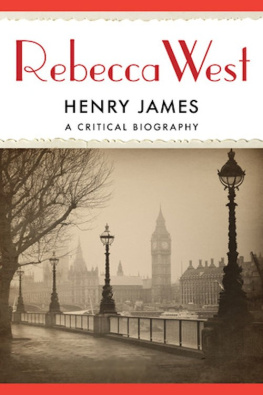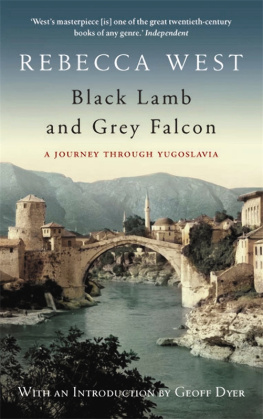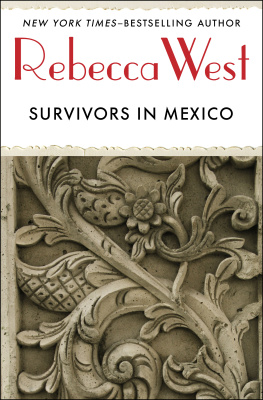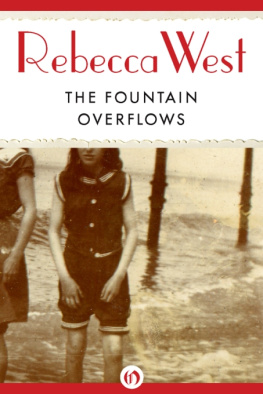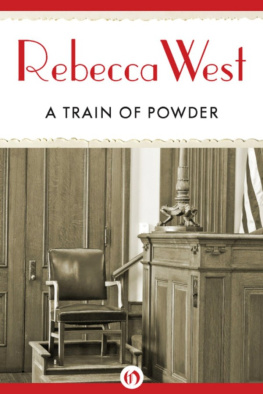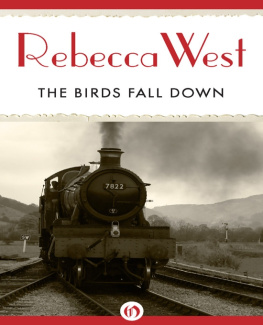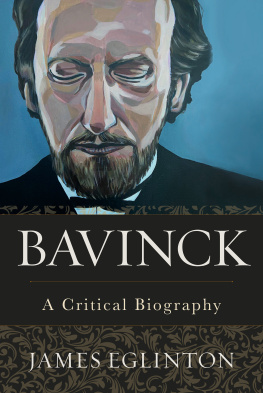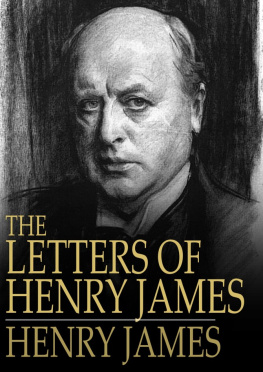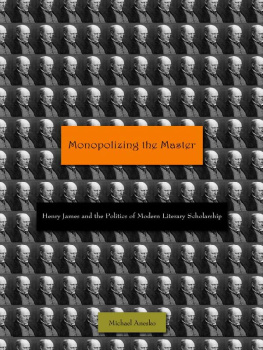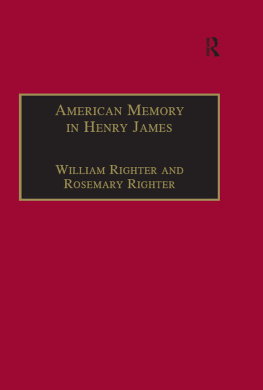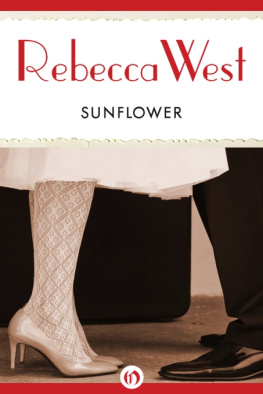Rebecca West - Henry James: A Critical Biography
Here you can read online Rebecca West - Henry James: A Critical Biography full text of the book (entire story) in english for free. Download pdf and epub, get meaning, cover and reviews about this ebook. year: 2009, publisher: BiblioBazaar, genre: Detective and thriller. Description of the work, (preface) as well as reviews are available. Best literature library LitArk.com created for fans of good reading and offers a wide selection of genres:
Romance novel
Science fiction
Adventure
Detective
Science
History
Home and family
Prose
Art
Politics
Computer
Non-fiction
Religion
Business
Children
Humor
Choose a favorite category and find really read worthwhile books. Enjoy immersion in the world of imagination, feel the emotions of the characters or learn something new for yourself, make an fascinating discovery.
- Book:Henry James: A Critical Biography
- Author:
- Publisher:BiblioBazaar
- Genre:
- Year:2009
- Rating:4 / 5
- Favourites:Add to favourites
- Your mark:
- 80
- 1
- 2
- 3
- 4
- 5
Henry James: A Critical Biography: summary, description and annotation
We offer to read an annotation, description, summary or preface (depends on what the author of the book "Henry James: A Critical Biography" wrote himself). If you haven't found the necessary information about the book — write in the comments, we will try to find it.
Henry James: A Critical Biography — read online for free the complete book (whole text) full work
Below is the text of the book, divided by pages. System saving the place of the last page read, allows you to conveniently read the book "Henry James: A Critical Biography" online for free, without having to search again every time where you left off. Put a bookmark, and you can go to the page where you finished reading at any time.
Font size:
Interval:
Bookmark:
HENRY JAMES
HENRY JAMES
By
REBECCA WEST
KENNIKAT PRESS, INC. / PORT WASHINGTON, N. Y.
HENRY JAMES
First Published in 1916
Reissued in 1968 by Kennikat Press
Library of Congress Catalog Card No: 67-27663
Manufactured in the United States of America
I wish to acknowledge my indebtedness for help in compiling the bibliography to Mr James B. Pinker, Miss Wilma Meikle, and Messrs Constable; and to Messrs Macmillan for the loan of the New York Edition of the Novels and Tales of Henry James.
R. W.
| CONTENTS |
|---|
| PAGE |
| THE SOURCES |
| THE INTERNATIONAL SITUATION |
| TRANSITION |
| THE CRYSTAL BOWL |
| THE GOLDEN BOWL |
THE SOURCES
A T various times during the latter half of the eighteenth century there crossed the Atlantic two Protestant Irishmen, a Lowland Scotsman, and an Englishman, and thereby they fixed the character of Mr Henry James' genius. For the essential thing about Mr James was that he was an American; and that meant, for his type and generation, that he could never feel at home until he was in exile. He came of a stock that was the product of culture and needed it as part of its environment. But at the time of his childhood and youthhe was born in 1843culture was a thing that was but budding here and there in America, in such corners as were not being used in the business of establishing the material civilisation of the new country. The social life of old New York and Boston had its delicacy, its homespun honesty of texture, its austerer sort of beauty; but plainly the American people were too preoccupied by their businesses and professions to devote their money to the embellishment of salons or their intelligence to the development of manners. Hawthorne and Emerson and Margaret Fuller and their friends were trying to make a culture against time; but any record of their lives which gives a candid account of how desperately these people had to struggle to make the meanest living shows that the poor American ants were then utterly unable to form the leisured community which is the necessary environment for grasshoppers. "The impression of Emerson's personal history is condensed into the single word Concord," wrote Mr James later, "and all the condensation in the world will not make it rich." There was no blinking the fact that in attempting to set up in this unfinished country Art was like a delicate lady who moves into a house before the plaster is dried on the walls; she was bound to lead an invalid existence.
This incapacity of America to supply the colour of life became obvious to Henry and William James, the two charming little boys in tight trousers and brass-buttoned jackets, one of whom grew up to write fiction as though it were philosophy and the other to write philosophy as though it were fiction, at a very early age. It did not escape their infant observation that the ladies and gentlemen who fascinated them by dancing on the tight-rope at Barnum's Museum always bore exotic names, and when they grew older and developed the youthful taste for anecdotic art they found it could be gratified only by such European importations as Thorwaldsen's Christ and His Disciples, the great white images of which were ranged round the maroon walls of the New York Crystal Palace, or Benjamin's Haydon's pictures in the Dsseldorf collection in Broadway. And when they grew older still and began to show a fine talent for painting and drawing their unfolding artistic sense found more and more intimations of the wonder of Europe. A View of Tuscany that hung in the Jameses' home was pronounced by a friend who had lived much in Italy not to be of Tuscany at all. Colours in Tuscany were softer; but such brightness might be found in other parts of Italy. So Europe was as various as thata place of innumerable changing glories like a sunrise, but better than a sunrise, inasmuch as every glory was encrusted with the richness of legend.
But most powerful of all influences that made the Jameses rebel against the narrowness of Broadway and the provincial spareness of the old New York, which must have been something like a neat virgin Bloomsbury, was their father. The Reverend Henry James was wasted on young America; it had developed neither the creative stream that would have inspired him nor the intellectual follies that he could slay with that beautiful wit which made him one of the great letter-writers of the world. "Carlyle is the same old sausage, fizzing and sputtering in his own grease, only infinitely more unreconciled to the blest Providence which guides human affairs. He names God frequently and alludes to the highest things as if they were realities, but all only as for a picturesque effect, so completely does he seem to regard them as habitually circumvented and set at naught by the politicians." The man who could write that should have been a strong and salutary influence on English culture, and he knew it. It is probable that when he and his wife paid what Mr James tells us was their "first (that is our mother's first) visit to Europe, which had quite immediately followed my birth, which appears to have lasted some year and a half"the last clause of this sentence is unfortunate for a novelist famous for his deliberationhe brought his babies with him with a solemnity of intention, as if to dip them in a holy well. Thus it was that the little Jameses not only bore themselves proudly through their childhood as became those who had lived as babies in Piccadilly, and read Punch with a proprietary instinct, but were also possessed in spirit by something that was more than the discontent with the flatness of daily life and the desire for a brighter scene that comes to the ordinary child. From their father's preoccupation they gained a rationalised consciousness that America was an incomplete environment, that in Europe there were many mines of treasure which they must find and rifle if they hoped for the health of their minds and the salvation of their souls.
In 1855, when Henry James was twelve, the family yielded to its passion and crossed the Atlantic. The following four years were of immense importance to Mr James, and consequently to ourselves, for he had been born with a mind that received impressions as if they had been embraces and remembered them with as fierce a leaping of the blood; just as his brother William's mind acquired and created systems of thought as joyously as other men like meeting friends and establishing a family. He found London in the main jolly, rather ugly, but comfortable and full of character, just as he had seen it in Punch, but here and there detectednotably on a drive from London Bridgeblack outcrops of Hogarth's London. "It was a soft June evening, with a lingering light and swarming crowds, as they then seemed to me, of figures reminding me of George Cruikshank's Artful Dodger and his Bill Sykes and his Nancy, only with the bigger brutality of life, which pressed upon the cab, the Early Victorian four-wheeler, as we jogged over the Bridge, and cropped up in more and more gas-lit patches for all our course, culminating, somewhere far to the west, in the vivid picture, framed by the cab window, of a woman reeling backward as a man felled her to the ground with a blow in the face." He knew Paris, then being formed by the free flourish of Baron Haussmann into its present splendours of wide regularity, yet still homely with remnants of the dusty ruralism of its pre-Napoleonic state; he saw all the pretty show of the Second Empire, he stood in the Champs-Elyses and watched the baby Prince Imperial roll by to St. Cloud with his escort of blue and silver cent-gardes; and the Galerie d'Apollon in the Louvre, its floors gleaming with polished wood, its walls glowing with masterpieces, and its proportions awesomely interminable and soaring, was the scene of his young imaginative life. Those were the great places; but there were also Geneva and Boulogne and Zurich and Bonn, the differences of which he savoured, and above all the richness of desultory contact with arts and persons of the various countries. He gaped at the exquisiteness of ugly Rose Chri at the Gymnase, copied Delacroix, read
Next pageFont size:
Interval:
Bookmark:
Similar books «Henry James: A Critical Biography»
Look at similar books to Henry James: A Critical Biography. We have selected literature similar in name and meaning in the hope of providing readers with more options to find new, interesting, not yet read works.
Discussion, reviews of the book Henry James: A Critical Biography and just readers' own opinions. Leave your comments, write what you think about the work, its meaning or the main characters. Specify what exactly you liked and what you didn't like, and why you think so.

